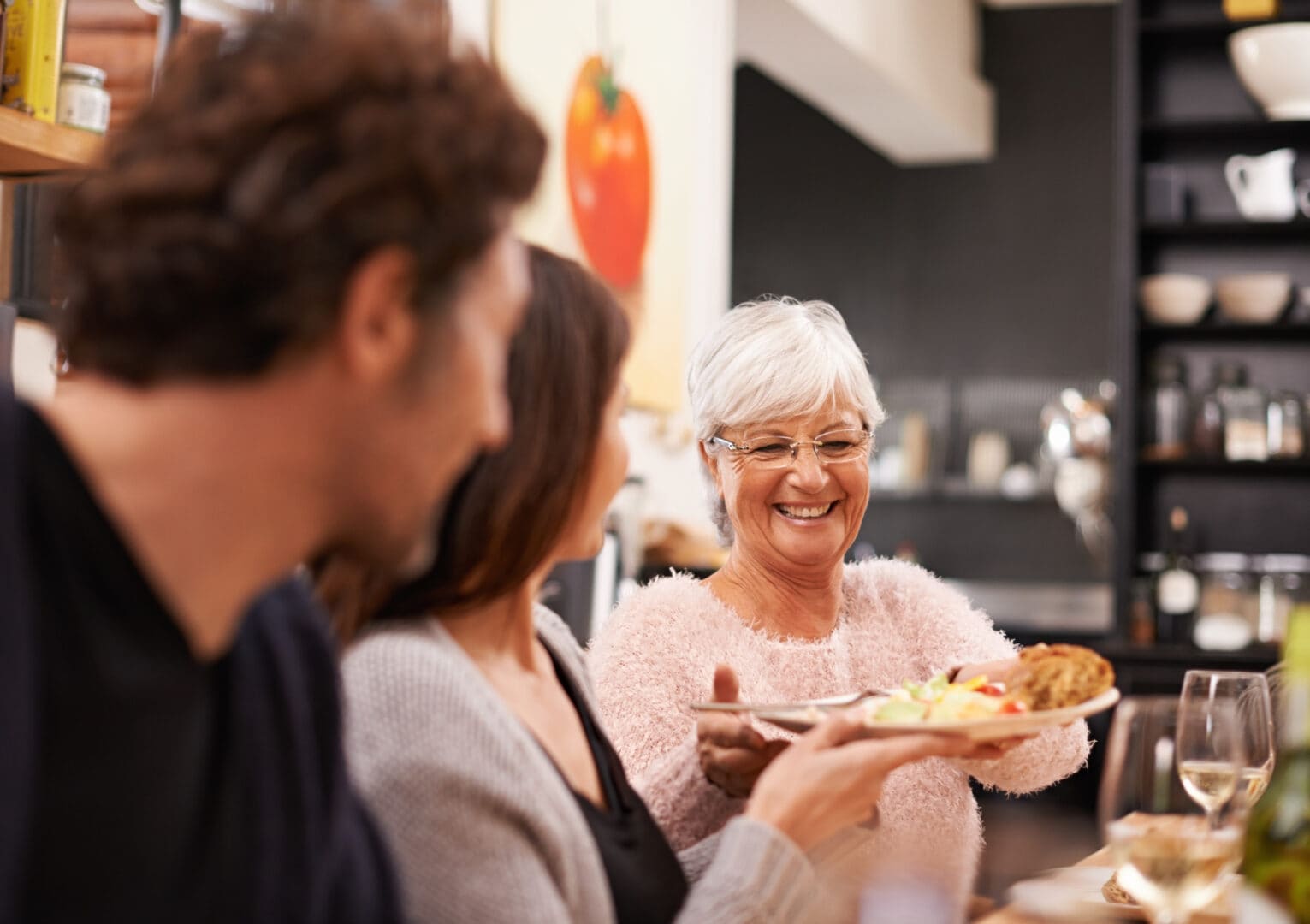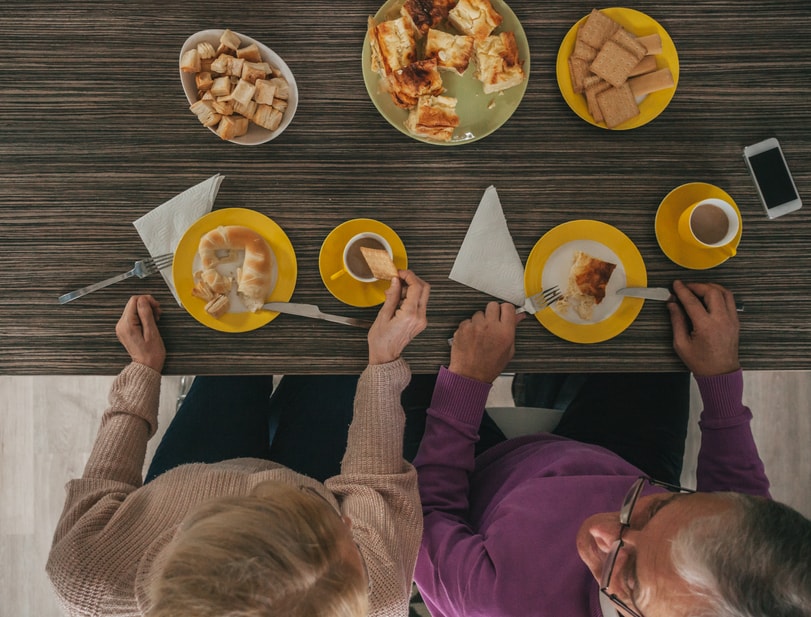My fiance and I were my father-in-law’s only caregivers. He was a man with a very particular palette, who, after years of smoking, didn’t like food that tasted healthy. We appeased his tastes by serving him his desired dish of grits and eggs for every meal of every day leading up to his passing.
Our experience illustrates just how challenging it can be to please an older adult at the dinner (and lunch and breakfast) table. And while some may be stuck in their ways, others may struggle with age-related appetite changes. But if you’re providing meals for a senior, it’s important to hold both solid nutrition as well as the safety and dignity of the older adult in mind, says registered dietitian Fareeha Jay.
Here are nutrition mistakes that you might make if you’re caring for an older adult as well as solutions.
1. Mistake: Missing important details related to an older adult’s diagnoses
Woodbury, New Jersey-based family caregiver Cheri Slack’s father-in-law Ed loves sweets and beer and hates veggies. But he also happens to have end stage renal disease and is on dialysis. Before fully understanding what this meant, Slack told him to drink lots of water, eat bananas, and she would prepare dishes that aren’t exactly kidney-friendly.
But with renal disease, potassium — which bananas are high in — and phosphorus levels must be monitored, since the kidneys are not able to filter the minerals as well, if at all. Many dialysis patients also have water intake limits since they may not urinate properly.
The solution: What happened with Slack serves as a warning registered dietitian Sharon Palmer encourages other family caregivers to be aware of: If your loved one has a diagnosis that could require specific nutrition (such as celiac disease or kidney conditions), it’s important to consult a registered dietician. And pay attention to how your parents respond to changes. If they’ve lost weight or have a low appetite, a registered dietician can help.
2. Mistake: Forgetting that aging affects appetite
Studies show that seniors appetites’ may decrease over time and that their energy needs change past the age of 65. This could be a result of an acute condition, like cancer, but a slower, aging metabolism and lack of activity can result in needing fewer calories. That’s why serving too-large portions can end up feeling overwhelming for an older adult, says registered dietician Christina J. Smith.
The solution: “For some, it is more beneficial to give smaller portions at meal times and encourage snacking in between meals,” says Smith.
Instead of worrying about adding volume, add more calorie and protein-dense foods, advises Smith. “It is critical for individuals to consume enough calories and protein to maintain their weight while also maintaining muscle integrity,” she says.
Jay adds that food fortification can help you sneak more calories into your older loved one’s food. “Small quantities of everyday foods like cream, milk powder or butter add in more calories without adding volume,” she notes. You might also consider adding eggs, nut butters, avocado, jams, honey and grated cheese to everyday dishes.
Also, make a point to reach for whole foods — especially when striving to get an aging loved one’s protein requirements. But if they’re struggling with solid food, protein shakes can help them maintain overall health, muscle function, balance agility and resilience, says Jay.
3. Mistake: Focusing too heavily on carbs
Palmer says that given the fact they’re affordable and easier to access, starches, grains, potatoes and pasta tend to be the focus of many plates served to seniors. But protein is essential as well. “People benefit from more protein as they age to help maintain muscle mass and functioning,” says Palmer.
The solution: She recommends adding healthy, lean proteins to each meal and snack. Think lean meats, nuts and seeds, eggs, beans and high-protein soups.
“It’s true that food is fuel for our body, but food is also consumed for pleasure, connection, celebrations and memories; it also satisfies us in times of sadness, anxiety and depression”
—Fareeha Jay, registered dietician
4. Mistake: Struggling to regulate comfort foods
Lumberton, New Jersey-based caregiver Megan Nessell’s grandmother was a diabetic, but she would not trade her comfort foods for healthier options. She asserted, “That’s what the medicine is for.”
In turn, Nessell prepared her grandmother hearty, yet reasonable meals like pot roasts, ziti and meatballs and roast pork with veggies and mashed potatoes. She’d also let her choose a few meals for herself from favorite local restaurants, including a Danish that she’d freeze for breakfast.
Similarly, caregiver Shina Kang’s mom gets whatever she wants when she visits her long-term care facility. “When we visit, she asks for a McDonald’s Filet-O-Fish,” she says. “That’s her favorite. That, a Popeye’s chicken sandwich or Chinese takeout brings her joy.”
The solution: Jay explains that allowing unlimited access to comfort foods, seniors may be at risk for hypertension, heart disease and diabetes.
But moderation is key. “It’s true that food is fuel for our body, but food is also consumed for pleasure, connection, celebrations and memories; it also satisfies us in times of sadness, anxiety and depression,” says Jay.
And for malnourished seniors, dishes that seem too high in fat might actually be beneficial, says Jay. “For instance, mac and cheese would be a fabulous source of energy, protein and dairy,” she notes.
In other words, it’s important to look at the big picture. A senior’s values, needs and preferences must be kept in mind at mealtime, explains Jay.
5. Mistake: Adhering to outdated habits
A lot of seniors — or their parents — may have come from poverty or war-torn or developing countries, and old-fashioned habits are tough to break. This could mean that an older adult forces themselves to finish everything on their plate or eats fattening foods like chitterlings or saves grease for later use.
“Your parents and grandparents may not be interested in exploring different types of food and prefer their food prepared in a specific way,” says Smith. But the answer isn’t to throw up your hands.
The solution: Smith believes that caregivers need to be compassionate and logical when contending with deeply-ingrained habits. It might be as simple as offering just half a sandwich instead of a whole so they don’t feel pressured to either eat too much or waste food.
While respecting your loved one’s food preferences, Smith encourages caregivers to keep seniors’ safety in mind too. For instance, aging adults who are living on their own may not be discarding food appropriately — due to psychological and/or financial pressures — so you might want to check the refrigerators and pantries for items past their expiration.
Know when to consult an expert
When you’re dealing with age-related changes, rigidity or simply an older adult who’s asserting their independence, you could be facing an uphill battle. If you’re feeling uncertain or overwhelmed about your loved one’s mealtime, it’s time to partner with experts. A registered dietitian — as well as your loved one’s physician — are equipped to handle geriartic meal concerns, especially any related to illness.
Smith says by working with a care team, you can figure out how to strike the balance between serving your loved one healthy picks and all of those comfort foods.





